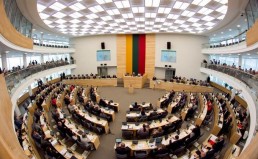On September 6th 2018, the Parliament of the Republic of Lithuania held a conference on the state of the rights of transgender persons, during which international and local human rights experts as well as medical and legal representatives discussed the situation in Lithuania ahead of decisions on the pending gender reassignment bill drafts. Prof. Vytautas Mizaras
Tag Archive: lithuanian parliament

Returning to the 3rd regular session Lithuanian Parliament preparing is preparing to debate on four legislative amendments and legislative initiatives that would restrict LGBT rights. Even though a certain progress may be observed, as legislative initiatives clearly infringing upon freedoms of association and expression have not been registered, the proposed amendment to the Constitution, Law

Lithuanian Parliament adopted it’s work agenda, preparing to debate on three legislative amendments and legislative initiatives that seek to restrict LGBT rights as well as the international commitments to uphold freedom of expression and to fight discrimination. The infamous amendment (XIIP-1217) to Article 38 of the Constitution of the Republic of Lithuania stating that “family

On September 14th the Lithuanian Parliament adopted its autumn agenda, preparing to debate on five legislative amendments and legislative initiatives that seek to restrict and openly violate LGBT rights as well as the international commitments to uphold freedom of expression and to fight discrimination. First, there is the infamous Article 38 of the Constitution of
On September 10, 2016 the members of the Homeland Union – Lithuanian Christian Democrats party convened a Council meeting. Since Gabrielius Landsbergis, MEP and the Chairman of the Homeland Union party, had spoken about his support for same-sex partnerships, Irena Degutienė, the party’s Vice-Chairperson, felt the need to address the divisions within the party on

On June 28th, 2016 the Lithuanian Parliament voted in favor of the constitutional amendment, which seeks to eliminate same-sex couples from the ambit of the constitutional concept of family life. 74 MPs voted in favor of the constitutional amendment, 19 MPs voted against and 20 MPs abstained. This vote implicates that no sooner than in

On International Children’s Day, almost eighty nongovernmental organizations urged Lithuanian Parliament members not to change the existing constitutional definition of family, and to develop realistic measures to ensure protection and support for children and families. The NGOs noted that the proposed amendments provide no further benefit to families in Lithuania, but rather the opposite –

On March 20th, 2016 a meeting to consider the Constitutional amendment, which seeks to define “family life” as emanating exclusively from a marriage between a man and a woman, has been scheduled at the Legal Affairs Committee of the Lithuanian Parliament. However, the Committee failed to meet the quorum and the consideration of the draft

On 15th of March Lithuanian Parliament confirmed their new agenda which lists 5 initiatives seeking to restrict LGBT* persons’ human rights once again. The proposal to change article 38 of the Constitution of the Republic of Lithuania is of discriminatory nature and first registered at Seimas by the end of the year 2013. This amendment
Lithuania’s Social Democratic Prime Minister Algirdas Butkevičius abstained from commenting on the proposal by the MP Petras Gražulis to introduce administrative liability for any public denigration of the “constitutional family values”. However, the Prime Minister of Lithuania insists that „society must conform to the norms of decency“ or otherwise „claim responsibility“. „I really can not

